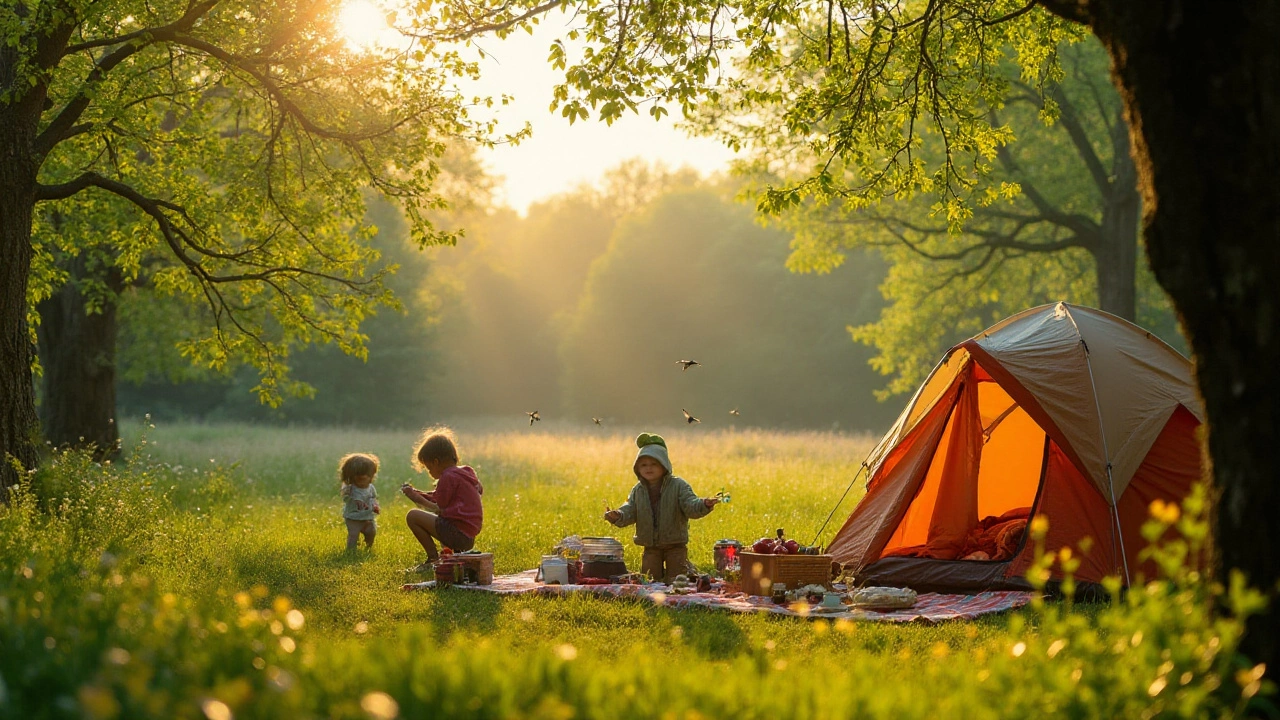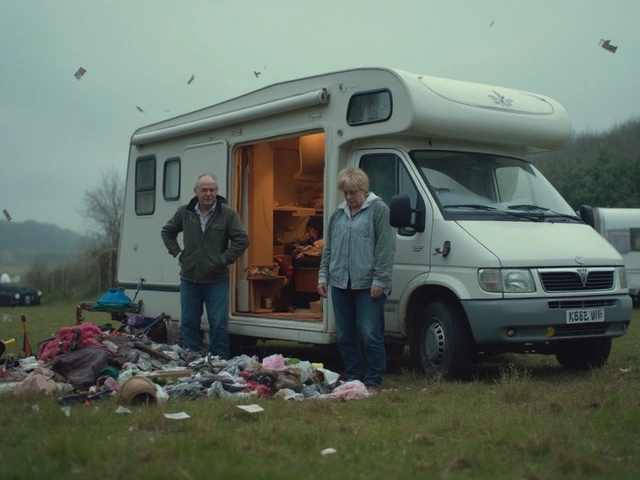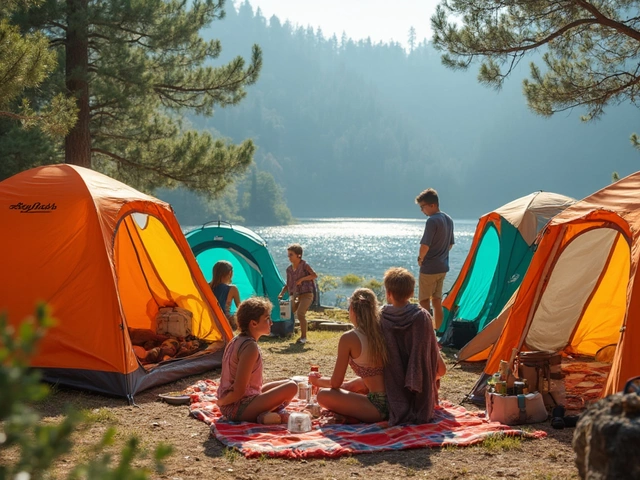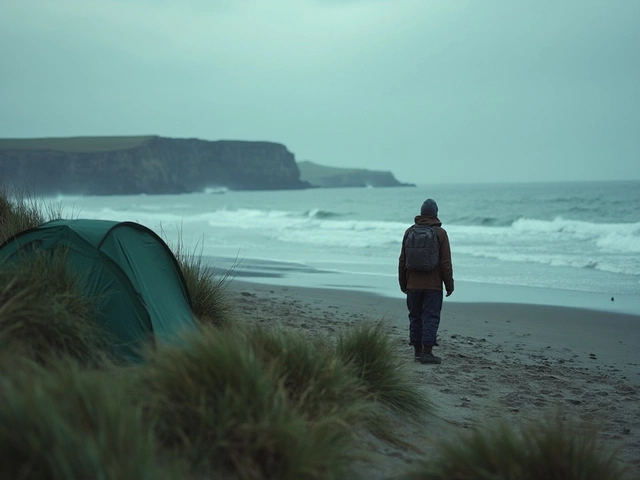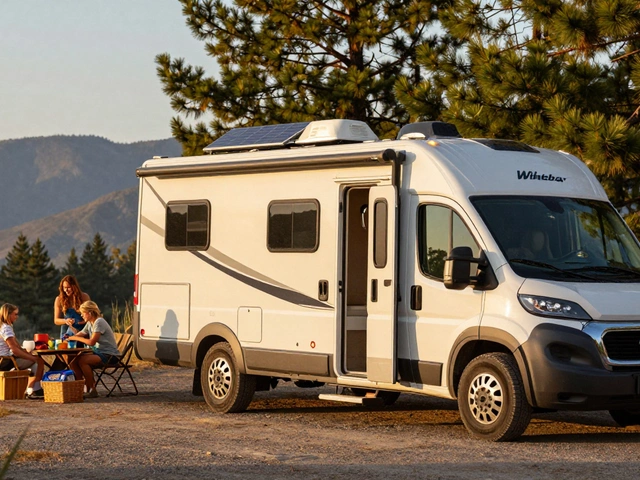Camping in the United Kingdom is a truly rewarding endeavor, offering a unique way to immerse oneself in the lush landscapes and historic charm of this island nation. But timing your camping trip just right can be crucial for the best experience. With each season bringing its own atmosphere and challenges, determining the best time to pitch your tent can make your adventures more enjoyable.
In this guide, we share insights into what makes each season special for camping in the UK, focusing on the highlights and considerations unique to spring, summer, autumn, and even winter. Whether you're a seasoned camper or a newcomer to the joys of sleeping under the stars, there's something enchanting about connecting with nature throughout the year.
Spring Camping Adventures
As the cold grip of winter gently eases into warmer days, camping in the UK during spring can feel like a breath of fresh air. The landscape begins to transform, offering a vivid display of budding flowers and rejuvenating greenery. This is the perfect season for those who relish witnessing nature’s rebirth while basking in a blend of mild temperatures and the occasional crisp breeze. Among the prime spots to experience this seasonal change is the Lake District, where serene walks reveal blankets of bluebells and the gentle hum of returning wildlife.
In these months stretching from March to May, the days begin to lengthen, gifting you with ample daylight for extended hikes or leisurely afternoons by the campfire. Whether you're pitching a tent or glamping in a yurt, the relatively quieter campsites make it an ideal time for introverts and peace seekers alike. Plus, for families eager to introduce young ones to the outdoors, spring presents a less daunting climate compared to summer’s hustle. Remember to pack layers, as UK’s spring weather can be delightfully unpredictable, transitioning from warm sunshine to sudden drizzle.
For those keen on wildlife spotting, springtime camping does not disappoint. Birds return from their winter retreats, and the dawn chorus becomes a melodic backdrop to mornings in the wild. In many national parks, you might spot young rabbits or deer emerging in the meadows, a sight that thrills both seasoned campers and children. What's more, spring is an optimal time for enthusiasts keen on foraging. Wild garlic and young nettles are some common finds, perfect for enhancing your campfire meals.
Benefits and Considerations
Embracing the great outdoors as plants awaken has its perks beyond just aesthetics. Anecdotal evidence from camping experts like that from the National Park Authority suggests that early-season campers often experience heightened relaxation and reduced stress levels, owing to fewer crowds and a closer connection to the environment. However, as romantic as it sounds, spring camping should not be underestimated. A strong tent is necessary to withstand occasional spring gales, and a reliable sleeping bag is non-negotiable to ensure a comfortable night’s rest during cooler evenings.
For the curious cook, spring offers a culinary palette ready to be explored. With the right knowledge, campers can forage for fresh ingredients that enhance their meals, something that adds a uniquely idyllic element to any trip. It's important to educate oneself about what's safe to eat and what's not, ensuring a foraging book or app is on hand. Also, be mindful of preserving the environment by practicing sustainable camping habits, such as leaving no trace and using eco-friendly products. This not only protects the habitats but also ensures future campers can enjoy the untouched beauty of these places.
“Camping in the spring can be a revitalizing experience, provided you are well prepared for the whims of nature,” notes John Muir Trust, a respected voice in the world of outdoor exploration.
Immersing oneself in spring camping adventures can rejuvenate the spirit and invigorate the senses. The lands are awakening, presenting an ideal opportunity for those who cherish tranquility punctuated by the sounds of nature’s renewal. So whether you're exploring hidden valleys or enjoying the grand views from atop rolling hills, a venture into the UK’s spring Campsites is bound to be a memorable experience.
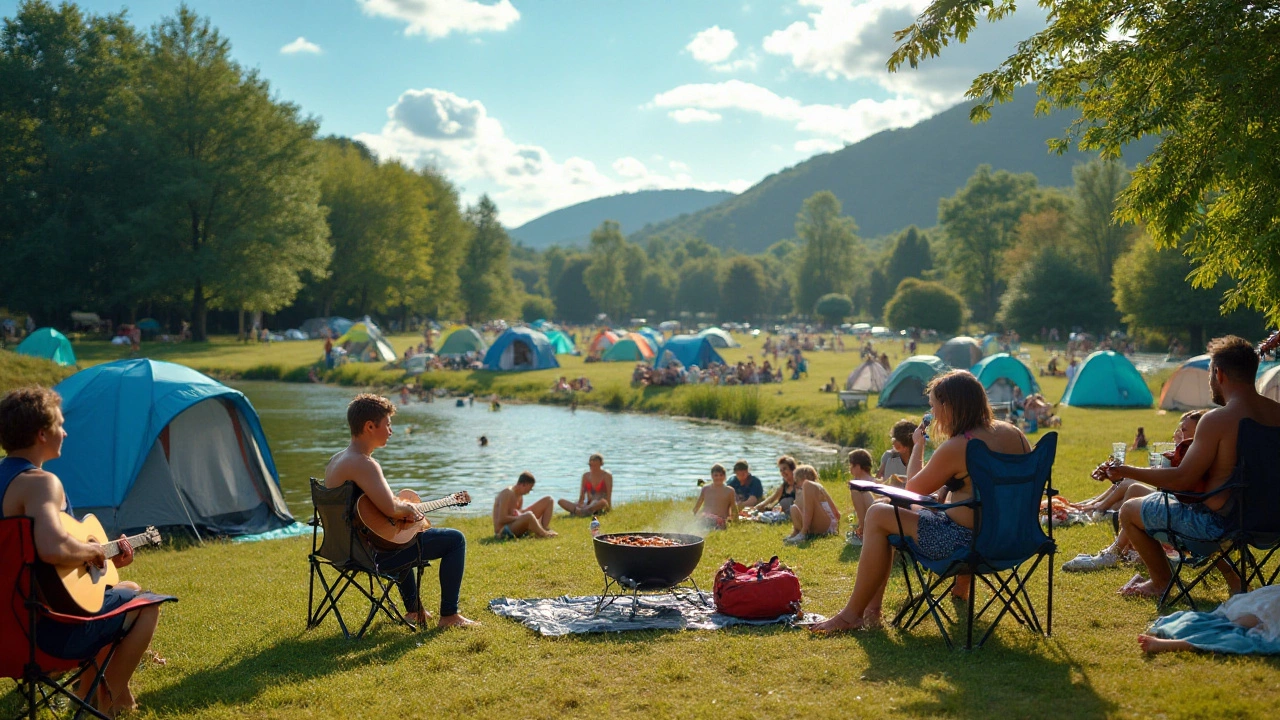
Summer Camping Tips
When it comes to camping in the UK, summer is the most popular time for good reason. The days stretch out gloriously, filled with sunshine that invigorates both body and spirit. However, mastering summer camping involves more than packing a tent and hoping for consistent fair weather. This season calls for planning that balances enjoying the vibrant outdoors with the practicalities of heat and increased crowds. Let's delve into the aspects that can turn a summer trip into a truly magical adventure.
A critical consideration for summer camping is choosing the right campsite location. The UK is dotted with countless beautiful sites, from coastal gems to emerald green hills. For summer, coastal areas like Cornwall and Pembrokeshire offer scenic ocean breezes, which are incredibly refreshing when temperatures climb uncomfortably high. Whether you're a fan of mountainous escapes in the Lake District or sand and sea, tap into the varied landscape of the UK for a memorable experience. Keep in mind that these coveted spots can fill up quickly, especially around school holidays, so early booking is prudent.
Camping tips for summer should always include an eye on hydration. The UK's summer sun, though mild compared to some countries, can still lead to dehydration if you’re unprepared. Always pack extra water bottles, aiming for reusable ones to be more sustainable. Complement the water with energy-boosting snacks such as nuts or dried fruits. Don’t underestimate the importance of a shaded area at your campsite, whether through natural features or an awning to give some reprieve from the sun.
When it comes to gear, clothing plays a significant role in making your adventure comfortable. Opt for light, breathable fabrics that can help keep your body cool during high temperatures. Layering is key; mornings and evenings can still be chilly even in the heart of summer. Don’t forget a wide-brimmed hat and sunglasses to protect against sun glare. And yes, sunscreen is a must, even on cloudy days, because those UV rays can be unyielding.
Let’s chat about campfires and cooking. Open fires may be restricted due to the dry conditions common in summer, so check campsite rules beforehand. Embrace the classic BBQ, which is a wonderful way to enjoy meals outdoors. Remember to ensure your grill is stable and at a safe distance from tents and trees. Explore local produce markets where you can pick up fresh ingredients to enjoy a pleasant, nature-infused meal.
Summer nights in the UK can still be very cool. Having a good quality sleeping bag, meant for the season, will help. You might be tempted to swap it for a lighter version during sultry days, but night temperatures can drop in more rural areas. Adding a sleeping mat or an inflatable mattress can vastly improve comfort, helping you rest well.
"The British summer offers the most splendid and manageable weather for camping, where the rustic appeal of the outdoors can be enjoyed profoundly," suggests James Miller, from the National Camping Month campaign.
Finally, embracing the spirit of adventure goes a long way. Plan daytime activities beyond the campsite to fully experience what summer brings. Hiking, cycling, and even river kayaking can be wonderful ways to explore the surroundings. With longer days, take advantage of twilight walks or simply gazing at the stars as daylight fades. It's this blend of preparation and spontaneity that makes camping in the UK during the summer so captivating.
| Average Temperature (°C) | Region |
|---|---|
| 18-25 | Southern England |
| 15-20 | Northern England |
| 14-20 | Scotland |
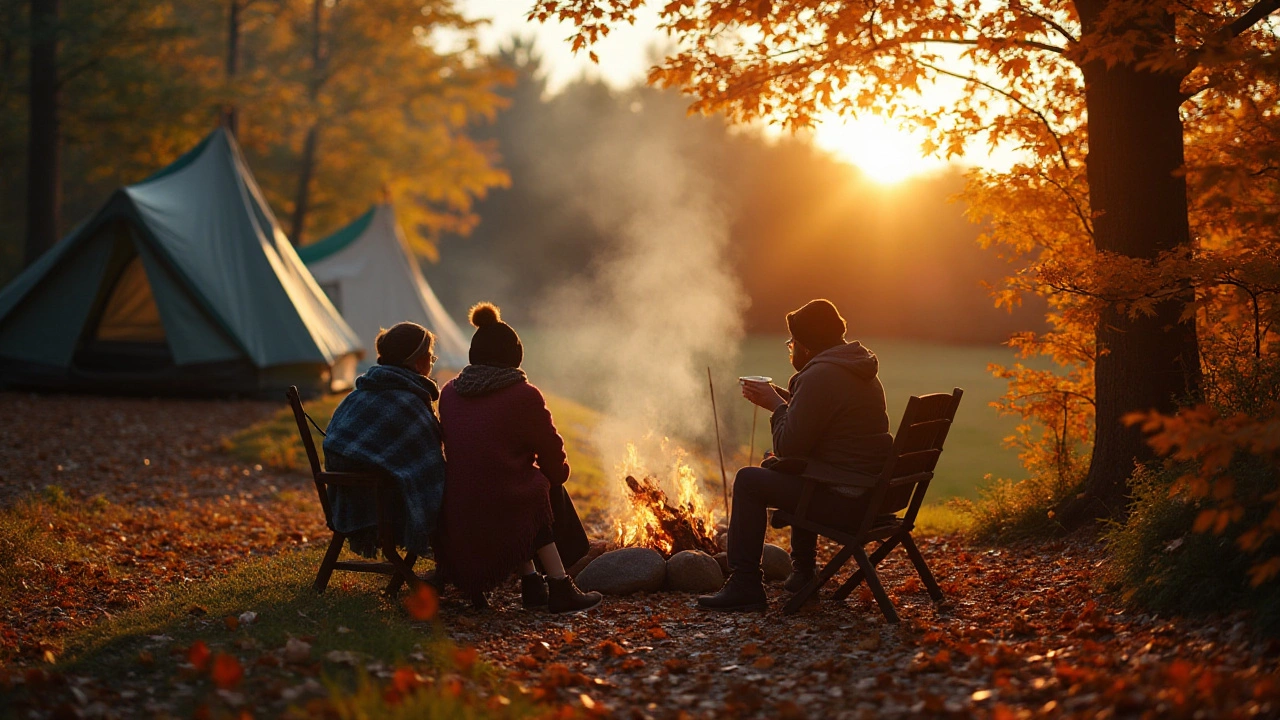
Autumn’s Splendor
Autumn in the UK unwraps a canvas of rugged beauty, where nature seems to catch its breath in a symphony of colors. The autumnal months, stretching from September to November, beckon campers with cooler temperatures and landscapes painted in hues of gold, red, and amber. It's a time when the hustle and bustle of summer wanes, leaving behind a serene and majestic playground just waiting to be explored. For those seeking solitude and a more peaceful experience, this could very well be the best time to enjoy the outdoors. The reduced crowd levels mean you can have some of the most stunning campsites almost to yourself, turning a camping trip into a deeply personal escape.
The autumn season also is a wonderful time for wildlife enthusiasts, offering a front-row seat to some fascinating natural spectacles. The forests are alive with the sounds of the rutting deer, and birdwatchers can revel in the sight of migrating species heading south. This time of year also highlights the richness of the UK's nature reserves and national parks, like the New Forest or the Scottish Highlands, which throng with activity not seen in the more static summer months. As nature readies itself for the winter pause, the trails become pathways to adventure peppered with fallen leaves and acorns crunching underfoot.
"Autumn carries more gold in its pocket than all the other seasons." This poignant quote by Jim Bishop perfectly encapsulates why many campers are drawn to the UK’s countryside during this time.
Weather-wise, this season offers a mixed bag; it's often quite temperate compared to the biting cold of winter or the peak summer heat. However, this does mean potential for rain showers, so packing the right gear is crucial. A good waterproof tent and warm sleeping bags should be at the top of your list. While the climate can be unpredictable, those crisp, clear afternoons where sunlight filters through the canopy make every drizzle worth enduring. Planning your camping activities around the weather forecast can maximize your enjoyment; a misty morning hike followed by an afternoon sipping something warm by the campfire can be the perfect itinerary.
For gourmets, autumn is also the season of harvest, and camping cuisine can take a delightful twist. Many local farms sell fresh produce directly to visitors. Imagine cooking a meal with freshly picked apples or enjoying a hot plum pudding in the chill evening air. There's an inherent charm in such simplicity, savoring the bounty of the land right where it thrives. Incorporating local produce not only enhances the culinary aspect of your trip but also supports the rural communities that help sustain these vibrant landscapes.
It’s worth noting that some sites may close or offer limited facilities as the season progresses, so it's important to check the operational status before you head out. Many sites, however, remain open and offer autumn discounts, making it a more budget-friendly option. Whether you’re a seasoned camper or a novice just setting off on your first adventure, the autumn months can provide not only breathtaking scenery but also a rich tapestry of experiences that stay with you long after you've packed up your tent.
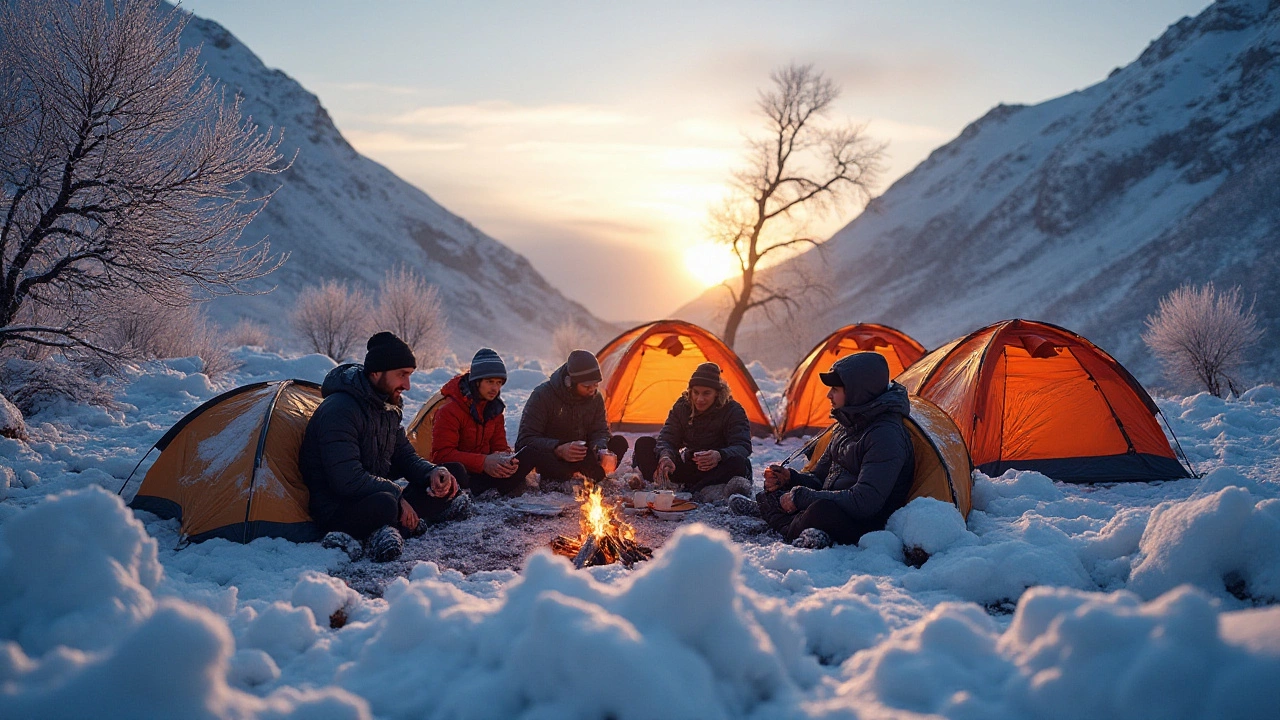
Winter Camping Advice
Winter camping in the UK is an enchanting experience that transforms familiar landscapes into frosty wonderlands. The crisp, invigorating air and the serene beauty of frost-covered fields and forests offer a unique appeal for outdoor enthusiasts. Yet, venturing out into the cold requires careful preparation and knowledge. Before embarking on a winter camping trip, one must consider the drastic changes in temperature and ensure they have the right gear to remain safe and comfortable. This includes a winter-rated sleeping bag and an insulated sleeping pad to keep the cold at bay. Your tent needs to be capable of withstanding blustery winds and perhaps a layer of snow, making four-season tents an excellent choice for these rigorous conditions. Planning and preparation can make the difference between a challenging ordeal and a memorable adventure.
Choosing the right location is crucial for a successful winter camping excursion. Avoid low-lying areas where cold air tends to settle, increasing the risk of discomfort due to cold temperatures. Instead, opt for slightly elevated spots that might provide better shelter from the wind. The Lake District and the Scottish Highlands are often cited for their stark winter beauty and provide extensive scenery for those brave enough to face the elements. Prepare to navigate these areas with caution, as shorter daylight hours and potentially icy trails can pose additional hurdles. Navigational tools such as maps and compasses become indispensable as visibility may be reduced, and battery-dependent devices might fail in extreme cold. Always inform someone of your intended route and expected return time for safety.
Another critical aspect of winter camping is managing nutritional needs. The cold demands more energy from the body to maintain warmth, which makes it essential to consume more calories than on a typical camping trip. Packing foods that provide long-lasting energy, such as nuts, dried fruits, and oatmeal, is vital. Hot meals and drinks not only add comfort but also play an essential role in sustaining body temperature. Carrying a reliable camp stove and fuel that performs well in cold conditions ensures that warming meals are always an option. Staying hydrated in the cold is often overlooked, as the chilling temperatures can mask the sensation of thirst. Hot drinks can encourage fluid intake, prevent dehydration, and provide warmth.
Safety in winter camping cannot be overstated. The UK’s weather can be unpredictable, and ensuring you have access to real-time weather updates is important. Dressing in layers is a fundamental principle to manage your body temperature effectively. Start with a moisture-wicking base layer, followed by insulating layers, and finish with a waterproof and windproof outer layer. Be vigilant about frostbite and hypothermia signs, as immediate attention is required to handle these conditions. Always have a contingency plan, which includes a first-aid kit and knowledge of emergency services contact numbers, though no specific one should be mentioned here. Group trips enhance safety as situations can be managed more efficiently when there’s help at hand.
As the seasoned adventurer and survival expert Ray Mears once said, "There is no bad weather, only inappropriate clothing." This highlights the importance of preparation and the wisdom of adapting to your environment rather than taking unnecessary risks.
Lastly, the tranquility of winter camping offers excellent opportunities for wildlife observation. Animals tend to leave visible tracks in the snow, providing enthusiasts a chance to see the paths of various creatures. The quiet of winter forests presents moments of rare peace only interrupted by the occasional snap of a twig in the distance. Keeping a respectful distance from wildlife ensures both your safety and theirs, allowing for a harmonious experience with nature. Remember that while winter camping in the UK presents its own set of challenges, with thorough planning and respect for nature, it can be a rewarding embrace of the season's stark yet beautiful offerings.
